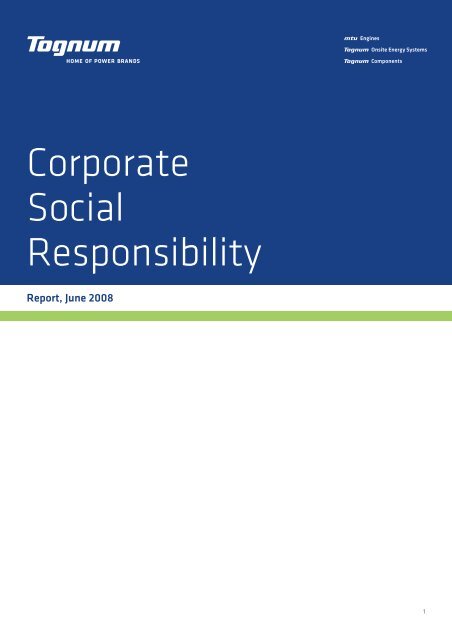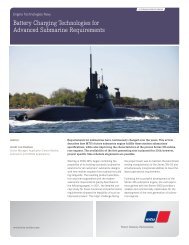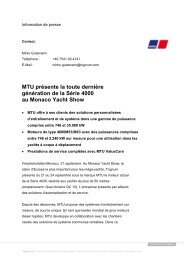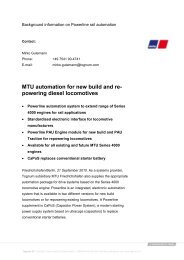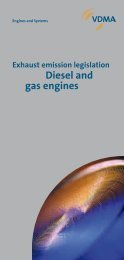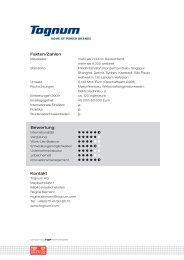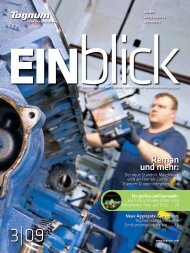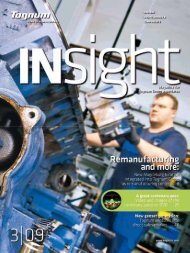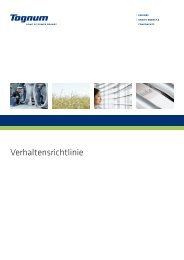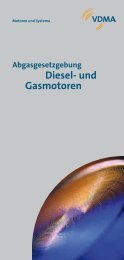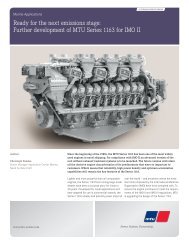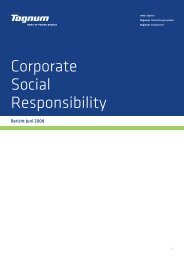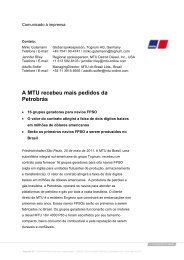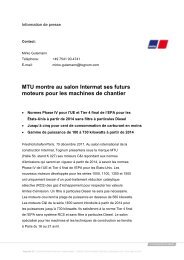Corporate Social Responsibility Report (810 KB) - Tognum AG
Corporate Social Responsibility Report (810 KB) - Tognum AG
Corporate Social Responsibility Report (810 KB) - Tognum AG
You also want an ePaper? Increase the reach of your titles
YUMPU automatically turns print PDFs into web optimized ePapers that Google loves.
<strong>Corporate</strong><br />
<strong>Social</strong><br />
<strong>Responsibility</strong><br />
<strong>Report</strong>, June 2008<br />
1
<strong>Corporate</strong> <strong>Social</strong> <strong>Responsibility</strong> | <strong>Report</strong>, June 2008<br />
<strong>Social</strong> and<br />
environmental<br />
responsibility<br />
Environmental, social and financial commitment is based<br />
on an understanding of what it is to be proactive and take<br />
personal responsibility. Only companies that are financially<br />
healthy and competitive in the international arena can<br />
contribute to the solution of social problems. The social<br />
responsibility assumed by a company depends on the<br />
sectors and markets in which the company operates. When<br />
a company focuses on certain ecological and social activities,<br />
this leads to competition in terms of the most sustainable<br />
corporate practices. 'Good Practice' examples, external codes,<br />
guidelines or standards can help the company orientate<br />
itself, in order to formulate internal principles and establish<br />
management systems.<br />
For <strong>Tognum</strong>, acting in a financially, ecologically and socially<br />
responsible way means safeguarding future competency<br />
and innovativeness, based on financial success. <strong>Tognum</strong><br />
supports sustainable social and ecological development<br />
above and beyond the statutory obligations of the company.<br />
2
<strong>Corporate</strong> <strong>Social</strong> <strong>Responsibility</strong> | <strong>Report</strong>, June 2008<br />
01 Environmental<br />
protection,<br />
production and sites<br />
Environmental policy and certification<br />
The companies within the <strong>Tognum</strong> Group use highly effective and efficient drive and energy<br />
systems. <strong>Tognum</strong> offers products to its customers that release few emissions into the environment,<br />
thanks to cutting-edge technology. In 2007, EUR 169 million was spent on development services.<br />
<strong>Tognum</strong> diesel engines are certified in accordance with stringent environmental regulations.<br />
<strong>Tognum</strong> develops heat / power systems with gas engines and fuel cells that use renewable energies.<br />
<strong>Tognum</strong> considers environmental protection to be a corporate value and a decisive competitive<br />
factor. <strong>Tognum</strong> sees sustainable business development as a long-term strategy for corporate<br />
management, whereby corporate and social requirements should balance one another out. The<br />
level of environmental commitment at <strong>Tognum</strong> is also demonstrated by the overall total of the<br />
various climate protection contributions and the environmentally friendly production processes<br />
that have been introduced at <strong>Tognum</strong> sites.<br />
The aim of the <strong>Tognum</strong> environmental policy is to integrate environmental protection systematically<br />
into management. This is why <strong>Tognum</strong> has used an independent expert organisation to<br />
certify its production sites in accordance with the internationally valid environment management<br />
system ISO 14001 since 2001. Using matrix certification, <strong>Tognum</strong> ensures that the same high environmental<br />
standards are implemented worldwide. In this way, <strong>Tognum</strong> can make sure that all<br />
legal environmental requirements are met, that its environmental policy is implemented and that<br />
its environmental aims are achieved. When it comes to suppliers and contract partners, <strong>Tognum</strong><br />
insists that they comply with all valid legislation and promotes the use of environmentally friendly<br />
solutions (e.g. within the framework of audits).<br />
Energy and climate protection<br />
Using combined heat and power reduces carbon dioxide emissions<br />
Improving our emissions is a vital environmental aspect for <strong>Tognum</strong>. In order to reduce CO 2<br />
emissions, all <strong>Tognum</strong> sites use natural gas where possible, as this energy source is lower in car-<br />
3
01 <strong>Corporate</strong> <strong>Social</strong> <strong>Responsibility</strong> | <strong>Report</strong>, June 2008 | Environmental protection, production and sites<br />
bon dioxide that others. <strong>Tognum</strong> is aiming to steadily reduce its emissions. Parts of our systems<br />
are involved in European emissions trading. The aim is to reduce emissions in the second trading<br />
period (2008-2010) to such an extent that <strong>Tognum</strong> will not have to exhaust its quota of emissions<br />
rights.<br />
Power and heat for manufacturing <strong>Tognum</strong> products are increasingly being generated by<br />
combined heat and power (cogeneration). This technology comes from the <strong>Tognum</strong> companies<br />
MDE, MTU and CFC Solutions. Using cogeneration units and a fuel cell, the company makes<br />
highly efficient use of the energy and thus reduces CO 2 emissions.<br />
As of June 2008, a high-temperature fuel cell at the Friedrichshafen site will supply the company's<br />
health insurance fund building (currently under construction) with heat and power. The<br />
'HotModule' from CFC Solutions, a subsidiary of <strong>Tognum</strong>, uses natural gas to generate 30 percent<br />
more electrical energy than a conventional power plant of the same size. The fuel cell generates<br />
245 kilowatts of power and 180 kilowatts of heat. The offices are heated by the warm water<br />
and the power is fed into the public mains grid. Energy is generated through an electrochemical<br />
process in the fuel cell module, i.e. without combustion. No sulphur dioxide or nitrogen oxides<br />
are produced. The exhaust air from the HotModule consists only of water vapour, nitrogen and<br />
the residual oxygen from the air.<br />
Cogeneration units are in operation at both <strong>Tognum</strong> sites in Friedrichshafen: the second<br />
natural gas cogeneration unit was started up in 2007. Using technology from the in-house<br />
corporate association, the two cogeneration units cover approximately a quarter of power and<br />
heat requirements. The combination of power and heat means that the company uses 73 percent<br />
of the energy contained in the natural gas. This high level of efficiency results in savings of 1,700<br />
tons of CO 2 a year in comparison to the separate generation of power and heat (see diagram).<br />
Operating for 7,500 hours a year, the cogeneration unit generates 13,900 MWh of power and<br />
8,800 MWh of heat per year.<br />
At the Augsburg site, the <strong>Tognum</strong> subsidiary MDE uses a natural gas cogeneration unit to provide<br />
economical and environmentally friendly power and heat for the production hall, warehouse<br />
and administrative building. In comparison to a conventional energy supply, MDE thus manages to<br />
reduce carbon dioxide emissions by 50 percent and also reduces primary energy use by 35 percent.<br />
Power savings through brightness-dependent lighting control<br />
Lighting in large workshops is controlled on a need-orientated basis with over 30 kW of<br />
light, in order to save energy and automatically ensure ergonomic and even lighting. In lighter<br />
environments, a third of the lights are switched off automatically in turn. The control system<br />
also takes the early and late shifts into account. These switch-offs result in an annual power<br />
Combined power/heat<br />
reduces carbon dioxide<br />
emissions at Friedrichshafen<br />
site:<br />
CO 2 emissions generated<br />
by MTU heating systems<br />
(in tons)<br />
8000<br />
6000<br />
4000<br />
2000<br />
- 13%<br />
2006 2007<br />
Cogeneration unit savings<br />
CO 2 emissions<br />
Picture on left:<br />
The cogeneration<br />
unit has been<br />
supplying MTU Plant<br />
1 with power and<br />
heat since 2007.<br />
Picture on right:<br />
Cogeneration unit at<br />
MDE in Augsburg:<br />
50 percent reduction<br />
in CO 2 .<br />
4
01 <strong>Corporate</strong> <strong>Social</strong> <strong>Responsibility</strong> | <strong>Report</strong>, June 2008 | Environmental protection, production and sites<br />
saving of 5,300 kWh for MTU in Friedrichshafen. The even use of the lights extends their<br />
operating time and thus saves resources.<br />
Energy usage in endurance tests<br />
MDE has seven development and series-production test benches with outputs of 500 to<br />
3,000 kW. The energy produced by the generator in test runs is fed into the public mains grid by<br />
MDE. The test benches run for approx. 210 working days a year. A unit is placed on the test<br />
bench for 2-3 days, with an actual operating time of 6-8 hours. At the Augsburg site, MDE generates<br />
approx. 1.3 million kWh per year with the test benches and a cogeneration unit. Of this,<br />
around 1 million kWh are fed into the local provider's mains grid. Using the power generated at<br />
the site results in a saving of approximately 1,200 tons of CO 2 a year.<br />
Air purification<br />
State-of-the-art technology reduces production-related emissions<br />
The fundamental emissions generated at <strong>Tognum</strong> are sulphur dioxide, carbon monoxide,<br />
nitrogen oxide and dust from the test benches and heating systems, as well as solvents from the<br />
painting systems. The use of state-of-the-art technology means <strong>Tognum</strong> can achieve the best<br />
possible reduction of emissions.<br />
Using water-based paint<br />
Thanks to gradual conversion from solvent-based to water-based paint systems, MTU is now<br />
releasing fewer solvents into the air every year. Although paint use has risen almost 100 percent<br />
since 2002 as engine production has risen, absolute consumption of solvents has fallen by almost<br />
50 percent in the same time period. The company works continuously with paint manufacturers<br />
to further develop the water-based paint systems and it is likely that use of water-based paint will<br />
continue to rise. To clean smaller engine components, MTU uses a cleaning system with an<br />
aqueous cleaning agent, utilising the residual heat from the test bench processes. A new cleaning<br />
procedure for large engines was introduced in 2007, with almost all solvent-based cleaning agents<br />
having been replaced by environmentally friendly ones.<br />
The drive shafts produced by the Rotorion subsidiary in Charleston are also protected against<br />
corrosion using water-based paints. Instead of conventional paint, the plant uses water-based<br />
paint that contains only 5 percent of solvent. This means that Rotorion's use of the new plant<br />
reduces the volume of released solvents by over 80 percent. The Friedrichshafen production site<br />
has also been working with water-based paint since the beginning of 2008.<br />
Paint rooms:<br />
Far less solvent is<br />
released, thanks to<br />
conversion to waterbased<br />
paint.<br />
5
01 <strong>Corporate</strong> <strong>Social</strong> <strong>Responsibility</strong> | <strong>Report</strong>, June 2008 | Environmental protection, production and sites<br />
Solvent-free cleaning agent<br />
Throughout its manufacturing process, L’Orange uses a solvent-free bio-cleaning agent that<br />
removes oil residues and grit with the help of microorganisms. In comparison to cleaner solvents,<br />
it is more efficient, non-combustible and has no hidden health risks. L’Orange has more than<br />
halved its solvent use. Components and tools are cleaned in special washbasins at 37 degrees<br />
(the optimum temperature for the microorganisms).<br />
Water protection<br />
Our aim is to use water as sparingly as possible and protect water from impurities as securely<br />
as possible. Wherever possible, we use circulation systems to reuse water.<br />
In Friedrichshafen Plant 2, rainwater from the eastern end of the site is cleaned through a<br />
gravel filter in a bio-purification plant for surface water. First, the rainwater is collected and fed<br />
into a forebay. Light materials that rise to the surface are retained there, while heavy materials<br />
and dirt particles sink to the bottom of the forebay. The water then runs through a gravel bed<br />
with reeds growing in it. The roots of the reeds provide further natural cleaning and it is only<br />
then that the water flows out into Lake Constance. This cleaning process achieves a similar result<br />
to that of a conventional rainwater purification basin, plus it saves energy and money.<br />
MTU also uses water from Lake Constance at Plant 2 to cool the test benches and machine tools.<br />
In order to savely avoid impurities, the installed monitoring systems are state-of-the-art. <strong>Tognum</strong> is<br />
currently working with energy suppliers on a concept that will enable the use of waste heat from<br />
the engine test benches to heat communal buildings in the neighbourhood.<br />
Soil protection<br />
For <strong>Tognum</strong>, the protection of soil and groundwater is one of the most responsible tasks<br />
related to environmental protection. The top objective is not to generate any impurities at all in<br />
the first place. Technical devices such as collecting basins, double-wall containers, sealed flooring<br />
and leakage warning probes can be used to prevent liquids that are hazardous to waters from<br />
entering the soil.<br />
At the Friedrichshafen site (which is almost 100 years old), the company has systematically<br />
detected all pollution and thereby ensured that there can be no contamination of the groundwater.<br />
Gravel filter:<br />
Bio-purification<br />
for rainwater.<br />
6
01 <strong>Corporate</strong> <strong>Social</strong> <strong>Responsibility</strong> | <strong>Report</strong>, June 2008 | Environmental protection, production and sites<br />
Waste avoidance<br />
Avoidance and reuse are better than disposal. That's why the reprocessing and recycling of<br />
raw, auxiliary and operating materials has been common practice for years. In order to prevent<br />
waste being generated at all, the company implements innovative technical processes and<br />
environmentally friendly production planning.<br />
The <strong>Tognum</strong> companies use returnable packaging and thus do not allow large volumes of<br />
wooden and cardboard waste to accumulate in the first place. The most crucial contribution is<br />
the delivery of vendor parts to the warehouse and assembly plants. <strong>Tognum</strong> specifies the use of<br />
returnable packaging in the container instructions and supplies such packaging, e.g. metal pallets.<br />
Returnable packaging is also used when sending finished parts for engines and drive shafts from<br />
Germany to assembly sites in the USA and Asia. When dispatching drive shafts supplied by<br />
Rotorion to automotive manufacturers in large numbers, special frames are used and these can<br />
be sent back.<br />
Traffic<br />
For parts transportation and the use of cars for business trips, <strong>Tognum</strong> uses particle filters and<br />
economical cars and lorries that comply with the EURO 5 emissions standard. The development<br />
of a car-sharing system means that approx. 15 percent fewer cars are needed. The carpool in<br />
Friedrichshafen comprises approximately 400 cars, lorries and vans. All diesel vehicles (including<br />
management vehicles and vans) are equipped with a diesel particle filter and thus achieve the best<br />
possible emission values.<br />
In 2008, two lorries will be purchased with Bluetec catalytic converters in compliance with the<br />
EURO 5 emissions standard. In the future, parts transportation between company sites will be<br />
carried out with these lorries. For urban traffic, <strong>Tognum</strong> has purchased ten Smart cars that are<br />
equipped with a start/stop function and therefore use approximately eight percent less fuel.<br />
<strong>Tognum</strong> promotes the formation of driving communities for the journey to work and for<br />
business trips. With the support of the company, a group of employees and works council members<br />
runs a bicycle group that provides free rental bikes for staff. The activities of the group include<br />
improving the infrastructure relating to cycling, managing changing rooms and lobbying for<br />
cycle paths.<br />
MTU Environmental Foundation<br />
As its site lies directly on Lake Constance, MTU has an especial responsibility for and a longterm<br />
interest in the protection of the ecological diversity of the lake. The company provides<br />
permanent support for environmental and nature conservation projects with the aim of maintaining<br />
the natural living conditions of plants, animals and humans in and around the lake. In 2004, the<br />
MTU Environmental Foundation was created for this purpose, with a foundation capital of more<br />
than half a million euros. The foundation supports measures to protect flora and fauna around<br />
Lake Constance, e.g. the 'Fischfreundliche Renaturierung Bodensee' ['Fish-friendly renaturation<br />
of Lake Constance'] research project. As an expert consultancy committee, the foundation's<br />
advisory board consists of highly skilled specialists from official bodies and the Baden-Württemberg<br />
State Institute for the Environment, Measurements and Nature Protection.<br />
7
<strong>Corporate</strong> <strong>Social</strong> <strong>Responsibility</strong> | <strong>Report</strong>, June 2008<br />
02Products and<br />
technology<br />
Resource-saving engines, drive and energy systems<br />
The companies in the <strong>Tognum</strong> Group contribute to environmental protection by developing<br />
low-emission engines, drive and energy systems that preserve resources. These technologies include<br />
diesel engines, gas engines, fuel cells and gas turbines.<br />
Key figures in 2007 for the <strong>Tognum</strong> Group<br />
Remuneration for development work EUR 169 million<br />
Development quota 6 %<br />
No. of employees involved in research and technology 680<br />
Patent registrations | of which in Germany 73 | 37<br />
Trademark rights held (end of 2007) | of which in Germany 897 | 356<br />
Diesel engines<br />
For the core product – diesel engines – MTU has decades of competence in the key technologies<br />
of injection, charging and electronics. The interplay between these three technologies makes it<br />
possible to optimise the combustion process and thus manufacture low-emission and lowconsumption<br />
engines.<br />
Key technology: injection<br />
Common rail injection technology has become the byword for highly developed engines in<br />
recent years. Why? It makes possible what was long held to be impossible: increasing the output<br />
of an engine while managing to reduce fuel consumption and achieve low emission levels at the<br />
same time. Since 1994, L’Orange has been working closely with MTU Friedrichshafen on the<br />
development of a common rail injection system for the 4000 series. This series was delivered by<br />
MTU in 1997 as the world's first series diesel engine with a common rail injection system.<br />
8
02 <strong>Corporate</strong> <strong>Social</strong> <strong>Responsibility</strong> | <strong>Report</strong>, June 2008 | Products and technology<br />
To date, L’Orange can still claim that it supplies the only common rail injection system with<br />
series-production experience for large diesel engines.<br />
Key technology: turbocharging<br />
MTU turbochargers are key components that can cope with high thermal and mechanical<br />
loads. And it is not just the powerful charging that gives the MTU drives their reputation as<br />
'high-performance, compact diesel engines'. The maximum amount of fuel that can be burned<br />
depends directly on the amount of oxygen in the combustion chamber. Engines without charging<br />
operate as aspirated engines, i.e. they only suck air into the combustion chamber through the<br />
suction stroke of the piston, where the air has around the same pressure as the environment.<br />
With turbocharged engines, the air is compressed to several times the ambient pressure and fed<br />
into the cylinders. To compress the supercharged air, turbocharging uses a freely available energy<br />
source: the flue gas stream. Approximately 40 percent of the fuel energy is converted into engine<br />
output, 30 percent is turned into exhaust-gas heat and a further 30 percent is turned into cooling<br />
heat. The turbines convert the energy from the exhaust-gas heat in small power plant units.<br />
Key technology: electronics<br />
MTU electronics control the engines and complete drive systems. In-house development and<br />
production make MTU flexible and ensure that these components are always available. The<br />
engine electronics are the 'electrical brain' of the engine and ensure that all components work<br />
together perfectly. It has been included as a key in-house technology in the engine concept from<br />
the start of engine development and is thus ideally integrated with all the other components.<br />
Key technology: exhaust gas recirculation<br />
A further technology option for the reduction of emissions within the engine is exhaust gas<br />
circulation (EGR). Mixing the cooled exhaust gas into the supercharged air can reduce the peak<br />
combustion temperature and thus reduce nitrogen oxide emissions (NO x) in diesel engines.<br />
Exhaust gas recirculation technologies in other engines have led to a five percent increase in fuel<br />
consumption, but the MTU engineers have developed a consumption-neutral system that even<br />
provides improved smoke emission values when combined with increased injection pressure.<br />
Exhaust gas recirculation is an ideal technology for achieving fulfilment of future emission limit<br />
values, particularly in terms of mobile drives for construction vehicles and locomotives.<br />
Key technology: exhaust gas after-treatment<br />
In the future, clean combustion via the optimisation of these three key technologies will no<br />
longer be enough to comply with the increasingly strict emission limit values. This is why<br />
exhaust gas after-treatment technologies will be needed: diesel particle filters and SCR catalytic<br />
converters that reduce soot particles and nitrogen oxides.<br />
Diesel particle filters have a porous filter structure in a honeycomb shape and the exhaust gas<br />
flows through this. The soot particles adhere to the filter walls, while the remaining exhaust gas<br />
flows onwards. This reduces particle emission by over 90 percent. The technical challenge is not<br />
so much the actual filtering of the particles from the exhaust gas, but rather the development of<br />
self-cleaning filters. New filter types with catalytic coatings may render active filter regeneration<br />
superfluous, using oxygen to convert soot particles into carbon dioxide and minimal quantities<br />
Diagram of exhaust<br />
gas recirculation in<br />
MTU engines for<br />
construction vehicles<br />
and locomotives.<br />
9
02 <strong>Corporate</strong> <strong>Social</strong> <strong>Responsibility</strong> | <strong>Report</strong>, June 2008 | Products and technology<br />
of ash. No additional fuel is needed to regenerate the filters. Other advantages include low weight<br />
and minimal installation space.<br />
PI TE<br />
NO x<br />
Another important step in exhaust gas after-treatment is the conversion of nitrogen oxides. A<br />
small amount of urea is added to the exhaust gas. In the commercial vehicle sector, this additive<br />
is known as AdBlue. In the SCR catalytic converters, nitrogen oxides are converted into water<br />
(H 2O) and harmless nitrogen (N 2) at temperatures of 200 to 500 degrees Celsius. The conversion<br />
quota can be as high as 90 percent.<br />
Gas engines in the MTU 4000 series<br />
In the gas engine sector for stationary energy supply, MTU Friedrichshafen has further optimised<br />
the new 4000 series. In 2008, MTU is offering a new model with additional cylinder variants.<br />
The engines in the 4000 series are available as 8-, 12-, 16- and 20-cylinder versions for natural gas<br />
operations. Further highlights of the latest development include an increase in output to 110 kW per<br />
cylinder (resulting in a mechanical output of 2.2 mW), further improvements in motor efficiency<br />
and the development of engines for biogas applications.<br />
Cogeneration with biogas<br />
NH 3 /NO x<br />
SiC-DPF SCR<br />
MTU TT8V 4000 Urea tank SCR control<br />
The decentralised energy systems at <strong>Tognum</strong> are characterised by their high level of efficiency in<br />
converting energy directly on-site. During cogeneration, power and heat are used at the same<br />
time, in order to achieve efficiency levels of up to 90 percent. This saves resources and reduces<br />
environmentally harmful emissions. <strong>Tognum</strong> offers cogeneration units that are based on gas<br />
engines and fuel cells. The use of regenerative biogas and special gases means that fossil fuels<br />
can be left alone, ensuring that the systems are CO 2-neutral.<br />
NO x<br />
TA<br />
Function diagram<br />
of exhaust gas aftertreatment<br />
with<br />
diesel particle filter<br />
and SCR catalytic<br />
converter.<br />
At the Uehlfeld<br />
biogas plant, crops<br />
are used exclusively<br />
to produce biogas.<br />
10
02 <strong>Corporate</strong> <strong>Social</strong> <strong>Responsibility</strong> | <strong>Report</strong>, June 2008 | Products and technology<br />
Fuel cells<br />
With its fuel cell technology, CFC Solutions has already taken a step towards the decentralised<br />
energy supply of the future. Based on a high-temperature carbonate fuel cell (the so-called<br />
'HotModule'), the system has impressed everyone with its unrivalled low emissions. In addition<br />
to supplying industrial premises and hospitals with heat and power, this technology is also likely<br />
to be employed in new usage areas that have arisen as a result of increasingly strict emissions<br />
regulations: the provision of an environmentally-friendly onboard power supply for ships is<br />
currently the subject of a research project.<br />
Diagram of a<br />
high-temperature<br />
carbonate fuel cell –<br />
the 'HotModule' from<br />
CFC Solutions.<br />
11
<strong>Corporate</strong> <strong>Social</strong> <strong>Responsibility</strong> | <strong>Report</strong>, June 2008<br />
03 <strong>Responsibility</strong><br />
for employees<br />
The <strong>Tognum</strong> <strong>AG</strong> companies are attractive employers. <strong>Tognum</strong> <strong>AG</strong> is committed to fulfilling<br />
its social responsibility and complying with the principles that form the basis of the Global Compact<br />
(a worldwide compact with ten basic principles that can be made between a company and the UN in<br />
order to improve the social and ecological configuration of globalisation). It supports this United<br />
Nations initiative and believes that social responsibility is a vital factor for the long-term success<br />
of the company. Equal opportunities and rights, effort and reward, flexibility, health and occupational<br />
safety are the guiding principles of the <strong>Tognum</strong> personnel policy.<br />
At the end of 2007, the total number of employees within the <strong>Tognum</strong> Group (consolidated<br />
companies) was 8,179, representing an increase of 1,027 people in the report period. Most of the<br />
personnel developments occured were employed in Germany (plus 594) and the USA (plus 413),<br />
with the latter particularly being the result of the takeover of the energy systems manufacturer Katolight<br />
Corp. in Minnesota. In Germany, over 800 employees were hired during the report period.<br />
<strong>Tognum</strong> employees (consolidated companies) by region<br />
31.12.2006 31.12.2007 Percentage<br />
Germany 6.154 6.748 83 %<br />
Europe (not including Germany) 128 134 1 %<br />
USA 466 879 11 %<br />
Asia 404 418 5 %<br />
Total employees 7.152 8.179 100 %<br />
By the end of the report period, 5,636 people were working at the Friedrichshafen site (including<br />
trainees and temporary personnel). The active workforce expanded by 430 people during<br />
the aforementioned period in comparison to the previous year. Most of these new appointments<br />
were in the engineering sector (plus 133), whereby the majority of those new appointments were<br />
in Development and Sales.<br />
12
03 <strong>Corporate</strong> <strong>Social</strong> <strong>Responsibility</strong> | <strong>Report</strong>, June 2008 | <strong>Responsibility</strong> for employees<br />
Occupational training<br />
Education lies at the heart of the company's trainee strategy. It supports the operational need<br />
for trained specialists and thus makes a fundamental contribution to the company's competitiveness.<br />
At the end of 2007, <strong>Tognum</strong> employed 424 trainees and apprentices. For the core MTU company,<br />
training – based on traditions spanning back over 89 years – is incredibly important, as the<br />
technologically demanding products can only be manufactured to comply with the required high<br />
quality standard by using well-trained expert personnel. In September 2007, 100 young people<br />
began their training with MTU; approximately 20 percent more than the previous year and<br />
almost double the numbers taken on in the mid-1990s. 82 trainees chose to study the commercial/technical<br />
sector and 5 chose the business sector. A further 13 young people are currently<br />
following a dual study course in cooperation with the Ravensburg University of Cooperative<br />
Education [Berufsakademie]. MTU has always incorporated the requirements of the working<br />
world in an ongoing flowing process. This is why it is now training two industrial engineers in<br />
cooperation with the Ravensburg University of Cooperative Education as part of the new study<br />
course offered by the University. L’Orange GmbH also offers the opportunity to study at the<br />
Ravensburg University of Cooperative Education. All trainees receive an introduction to<br />
'Sustainable Management' during their traineeship.<br />
Lively dialogue between education facilities and the company improves the opportunities<br />
for young people to receive targeted vocational training. For <strong>Tognum</strong>, this dialogue means the<br />
promotion of the next generation of committed and qualified personnel. The company's joborientated<br />
training measures focus, for example, on an extensive range of practical placements<br />
and thesis / dissertation courses for university students, as well as support for a variety of school<br />
projects.<br />
Management: selection and further education<br />
One of the company's basic principles is to staff management positions from within its own<br />
ranks as far as possible. For this purpose, an integrated management development system was<br />
implemented at the start of the 1990s, both for normal salaried employees and executives.<br />
Regular potential assessments by superiors are supplemented by German- and English-speaking<br />
assessment centre days that take place regularly on every continent. This facilitates the targeted<br />
promotion and development of personnel in terms of education advice, individual measures and<br />
development programmes.<br />
The company places<br />
great emphasis on a<br />
good education.<br />
13
03 <strong>Corporate</strong> <strong>Social</strong> <strong>Responsibility</strong> | <strong>Report</strong>, June 2008 | <strong>Responsibility</strong> for employees<br />
Awakening interest in technology and safeguarding the future<br />
Awakening interest in technology is an important objective in many of <strong>Tognum</strong>'s careers<br />
orientation activities. Work experience days at the <strong>Tognum</strong> companies offer schoolchildren and<br />
teachers the chance to gain an insight into the working life of an industrial company and experience<br />
technological innovations on a first-hand basis. MTU offers pupils from the 3 types of German<br />
schools [Hauptschule, Realschule and Gymnasium] the chance to take part in a week's work<br />
experience and find out how the business runs. In 2007, over 150 schoolchildren made use of<br />
this opportunity. <strong>Tognum</strong> also supports education initiatives such as 'Technik macht Schule'<br />
[Technology Makes Schools], 'Wissen was geht' ['Know What's Going On'] or 'Tour d’Innovation',<br />
an initiative from the Federal Ministry of Education and Research. These provide careers orientation<br />
support for young people and actively reinforce the dialogue between schools and industrial training.<br />
This dialogue is also supplemented by the teaching and examination activities of managers and<br />
staff in conjunction with the CCI, universities and vocational academies. <strong>Corporate</strong> social<br />
responsibility for reinforcing future capabilities finds particular expression in this context.<br />
'Youth researches – pupils experiment'<br />
Each year, MTU Friedrichshafen takes part in the regional 'Jugend forscht – Schüler experimentieren'<br />
competition in South Württemberg, organising this event in Friedrichshafen at regular<br />
intervals – as in February 2008. The winners of the state competition took part in a four-day<br />
research practical placement with MTU as special recognition of their achievements. An ideas<br />
competition like 'Jugend forscht' is important not just for the future of the young participants,<br />
but also for the industry. Technology companies need young people who are enthusiastic about<br />
technology and the natural sciences.<br />
Lifelong learning<br />
Personnel qualification is a fundamental basis for work satisfaction and personal development.<br />
The questions of qualification and lifelong learning are the key to safeguarding the competitiveness<br />
of the company, the jobs provided by the company and the employability of personnel. <strong>Tognum</strong><br />
believes that one of its permanent objectives is to open up new opportunities and paths for the<br />
further development of its employees within the company framework. During annual qualification<br />
meetings, superiors and employees work together in a partnership dialogue to decide on the<br />
qualification measures needed for each individual. Requirements are determined centrally by the<br />
company. Employees are offered a range of options: qualification measures that complement the<br />
job, plus an extensive further education programme that covers social and methodical competence,<br />
data processing, economics and law, technology, languages and inter-cultural issues.<br />
Occupational health and safety<br />
Local action, global thinking; that's what occupational health and safety is all about. The best<br />
way to get people to remember and implement occupational health and safety information from<br />
location-specific programmes and measures is to develop such programmes and measures in<br />
accordance with employees' needs. This is why specific campaigns are carried out at least once a<br />
year, focussing on subjects such as noise, skin or hazardous materials. <strong>Tognum</strong> wants to protect<br />
the health of its employees during work processes as best it can, as well as trying to exclude health<br />
risks to the greatest possible extent. All employees are required to take an active part in the safety<br />
Picture on left:<br />
Schoolchildren find<br />
out how a diesel<br />
engine works at the<br />
MTU Training Center.<br />
Picture on right:<br />
Young researchers<br />
at the 43rd regional<br />
competition in<br />
February 2008.<br />
14
03 <strong>Corporate</strong> <strong>Social</strong> <strong>Responsibility</strong> | <strong>Report</strong>, June 2008 | <strong>Responsibility</strong> for employees<br />
programmes and implement the resultant knowledge immediately in practice, in order to generate<br />
a feeling of safety and support the safe action of colleagues – setting an example to others and<br />
working safely at all times.<br />
The occupational health and safety policy covers all strategies that can offer the best possible<br />
working conditions for personnel. A wide range of occupational health and safety promotion<br />
measures is provided amongst the <strong>Tognum</strong> Group companies: health days at individual sites,<br />
education campaigns about preventative measures and subjects such as addiction, smoking,<br />
nutrition and movement, balanced meals in the canteens, management seminars about leadership in<br />
accordance with health and safety principles and measures to improve work organisation and<br />
facilitate flexible working time.<br />
Employees are regularly trained in the use of special machines or equipment and are also<br />
informed about occupational health and safety. There is an ongoing process to improve and<br />
increase safety, driven forward by education about safe behaviour and the regular exchange of<br />
information on related topics. Accident prevention regulations, information about hazardous<br />
materials and workstation ergonomics specifications are regularly updated and communicated<br />
to employees.<br />
Family and career<br />
In June 2007, MTU Friedrichshafen was rewarded for its family-orientated personnel policy<br />
with the 'basic audit berufundfamilie® certificate', presented by Ursula von der Leyen (Federal<br />
Minister for Family Affairs) and Dagmar Wöhrl (State Secretary). 'audit berufundfamilie®' recognises<br />
measures that are provided to improve the compatibility of work and family life and promotes<br />
the potential of companies and institutions through targeted consultation. The 'basic audit<br />
beruf und familie® certificate' is issued at the end of this process. The decisive criteria in the MTU<br />
Friedrichshafen assessment included the short-term 'Kindernest' care project (where daycare is<br />
provided if a childminder suddenly fails to show up), financial aid in emergency situations and<br />
release from work to look after dependents. The Jean-Raebel Foundation also pays allowances for<br />
the children of MTU employees. Monthly support is currently provided for 160 children of company<br />
personnel and young people who have carried out their training with the company and are<br />
now finishing their studies. There are plans to significantly expand the company's family-friendly<br />
measures, including the implementation of more flexible regulations for working hours and an<br />
increase in the number of telecommuting and part-time positions.<br />
There is also a new facility: a nursery near the company site, opened by MTU in September<br />
2007 in cooperation with the Evangelical Church Community, the city of Friedrichshafen and ZF<br />
Friedrichshafen <strong>AG</strong>. The 'Habakuk' nursery looks after children aged six months to three years<br />
and is open at particularly useful times for working parents.<br />
Employee support in times of emergency – Karl Maybach-Hilfe<br />
Karl Maybach-Hilfe GmbH Friedrichshafen has been providing help for MTU Friedrichshafen<br />
GmbH employees and their families since 1958. The scope of services offered by this care<br />
foundation includes benefits for those in need, those incapable of work and the elderly.<br />
Picture on left:<br />
Qualified training at<br />
the Training Center.<br />
in Friedrichshafen.<br />
Picture on right:<br />
<strong>Tognum</strong> staff work<br />
on a Series 4000 gas<br />
engine.<br />
15
03 <strong>Corporate</strong> <strong>Social</strong> <strong>Responsibility</strong> | <strong>Report</strong>, June 2008 | <strong>Responsibility</strong> for employees<br />
Working group for addicts<br />
MTU runs an 'Addictions' working group as a contact point for employees affected by<br />
addiction. The group consists of volunteers and officers from within the company, as well as<br />
external counsellors from Caritas and Diakonie, providing help for all types of addiction such as<br />
alcohol, eating disorders and drugs.<br />
Contact<br />
Matthias Jobmann<br />
Telephone (0 75 41) 90 24 29<br />
Fax (0 75 41) 90 39 09<br />
E-mail Matthias.Jobmann@tognum.com<br />
Editorial details<br />
Copyright © 2008<br />
<strong>Tognum</strong> Aktiengesellschaft<br />
Maybachplatz 1<br />
88045 Friedrichshafen/Germany<br />
www.tognum.com<br />
All rights reserved. Subject to technical alterations.<br />
16


